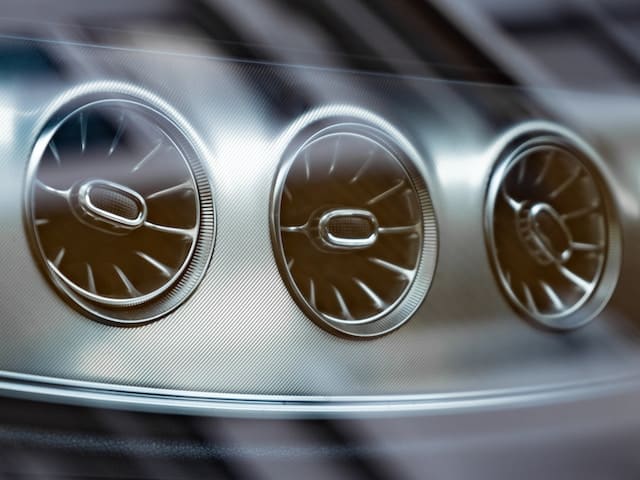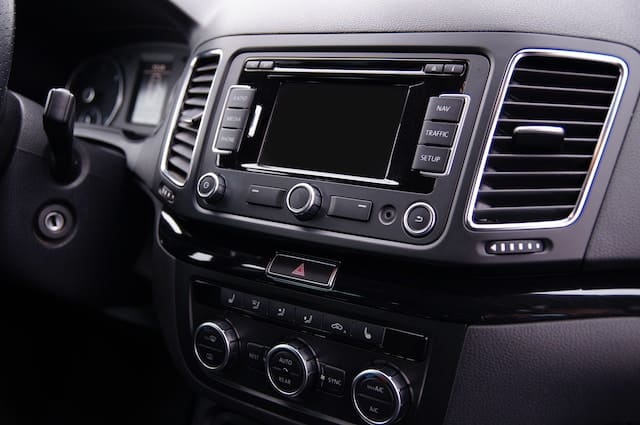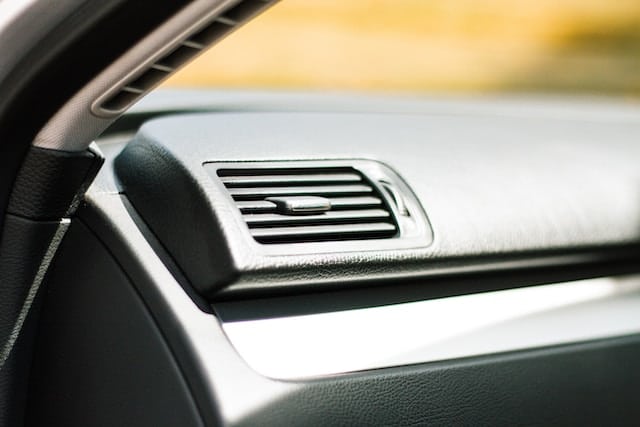
Your car’s air conditioning is an intricate network of parts, including the compressor, condenser, receiver-drier, expansion valve, and evaporator. Each of these elements has a specific role. The compressor pressurizes the refrigerant, the condenser cools it, the receiver-drier removes contaminants and moisture, the expansion valve controls refrigerant flow, and the evaporator cools the air before it’s blown into your vehicle.
Understanding these parts helps you identify when something isn’t working correctly. Regular maintenance, such as checking refrigerant levels, cleaning the system, and replacing the cabin filter, ensures optimal performance.
Common AC issues include insufficient cooling, unusual noises, and strange odors, which could indicate anything from refrigerant leaks to a worn-out compressor or bacterial growth. Knowledge of basic troubleshooting can be handy. However, most AC issues require professional attention to avoid damaging the system further. Always consult a professional mechanic for significant concerns.
Remember, a well-functioning AC system contributes not only to your comfort but also to your safety, as it assists in defogging windows during certain weather conditions. A deeper understanding of your car’s AC system helps you maintain it better and prolong its life.
Understanding How Your Car Air Conditioner Works

Your car’s air conditioning system isn’t just about providing a refreshing relief during hot weather; it’s a complex setup involving several key components that work in harmony to cool your car. Understanding the function of each component can provide insights into how the system operates and enable you to identify potential problems earlier.
Compressor
The heart of your car’s air conditioning system is the compressor. This belt-driven device compresses refrigerant gas and circulates it through the system. The process begins when the refrigerant enters the compressor. Here, it is compressed and transformed from a low-pressure gas into a high-pressure gas. The refrigerant, now hot from the compression process, moves on to the condenser.
Condenser
The condenser’s job is akin to your car’s radiator, except it dissipates heat from the refrigerant. As the refrigerant flows through the condenser, it loses heat and turns from a gas into a liquid. The refrigerant, now cooled and liquefied, moves into the receiver-drier.
Receiver-Drier
The receiver-drier (also known as the accumulator) serves as a safety net for the refrigerant. This component removes moisture and filters out impurities, ensuring that the refrigerant entering the evaporator is clean and dry. This is crucial, as moisture in the system can cause significant damage.
Expansion Valve
Before the refrigerant enters the evaporator, it must pass through the expansion valve. This component restricts the flow of the liquid refrigerant, causing a significant drop in pressure. As the pressure drops, the refrigerant turns back into a gas, becoming extremely cold in the process.
Evaporator
Finally, the cold, low-pressure refrigerant enters the evaporator, which is located inside the cabin of your car, typically behind the dashboard. As the blower fan pushes air over the evaporator’s coils, the refrigerant absorbs the heat from the air. This cools the air, which is then blown into the cabin. The refrigerant, now warmed and turned back into a low-pressure gas, returns to the compressor, and the cycle starts over.
In understanding these components and how they work together, you can more effectively identify potential issues in your car’s air conditioning system and converse more confidently with your mechanic.
The Importance of Regular Maintenance for Your Car Air Conditioner

Much like the engine or the brakes, the air conditioning system in your car is a critical component that requires routine maintenance. This not only ensures it operates at its best, but it can also prevent minor problems from escalating into major issues that could result in expensive repairs or replacements.
Maintaining Refrigerant Levels
One crucial aspect of air conditioner maintenance involves checking and maintaining the right refrigerant levels. The refrigerant is the substance that your air conditioning system uses to remove heat from the air. Over time, the level of refrigerant can decrease due to natural leakage, reducing the system’s efficiency. If the refrigerant levels drop too low, the system may fail to cool the air effectively, or it might not function at all. Regular checks and top-ups can help maintain the optimum performance of your car air conditioner.
Inspecting for Leaks
Routine inspections for leaks are also essential as part of the air conditioner’s regular maintenance. Even minor leaks can lead to a significant loss of refrigerant over time, negatively impacting the air conditioner’s cooling efficiency. More importantly, leaks can allow moisture to enter the system, which can cause severe damage. A mechanic can perform pressure tests to check for leaks and repair them promptly.
Assessing and Cleaning AC Components
Each component of the air conditioning system, from the compressor to the evaporator, should be regularly checked to ensure it is working correctly. A failing component can put a strain on the entire system and cause other parts to fail prematurely.
Additionally, cleaning is an essential part of regular maintenance. Over time, dust and dirt can accumulate in different parts of the air conditioning system, such as the condenser and evaporator. These accumulations can obstruct airflow, reducing the system’s cooling capacity. Regular cleaning can help maintain the efficiency of the air conditioner.
In summary, regular maintenance of your car’s air conditioning system is a necessary practice to ensure its long-term performance. It can help catch potential problems before they turn into significant issues, saving you from inconvenient breakdowns and costly repairs in the long run. It’s always a good idea to have a professional mechanic or service center perform this routine maintenance to ensure it’s done correctly and safely.
Common Car Air Conditioner Problems and Their Causes

Even with the best maintenance practices, car air conditioning systems can sometimes encounter problems. Understanding these common issues can provide crucial insights and help you determine when it’s time to seek professional help.
Insufficient Cooling
One of the most common problems car owners face with their air conditioning systems is insufficient cooling. This can be caused by several factors, including a low refrigerant level due to a leak or natural attrition, a clogged condenser that can’t dissipate heat effectively, or a malfunctioning compressor that isn’t properly circulating the refrigerant.
Strange Noises
If your air conditioning system starts producing unusual noises, it’s often a sign of an underlying issue. Squealing noises might indicate a worn or slipping AC compressor belt, while grinding or clicking sounds could suggest a failing compressor. It’s vital to have any strange noises checked by a professional to prevent further damage to the system.
Unpleasant Odors
Unpleasant odors emanating from your air vents when you turn on the AC can be quite off-putting. This issue is often due to bacterial, fungal, or microbial growth on the evaporator. These organisms thrive in damp environments and can proliferate when the AC system is not used for a long time, especially in humid climates. Regular cabin filter changes and professional cleaning can often resolve this issue.
Water Leaks Inside the Car
Another common issue is the presence of water inside the vehicle, typically under the dashboard. This problem usually indicates a blocked or broken condensate drain hose. The job of this hose is to remove the condensation produced by the AC’s evaporator. If it’s blocked or damaged, the water can end up inside your car instead.
These are just a few examples of the problems that can arise with car air conditioners. Recognizing these signs can help you take quick action and prevent minor issues from turning into major repairs. Remember, when it comes to diagnosing and repairing problems with your car’s AC, it’s always best to consult a professional. This can ensure your system is repaired correctly, prolong its lifespan, and keep your car comfortable no matter the weather outside.
Basic Troubleshooting Tips for Your Car Air Conditioner
While many issues with your car’s air conditioning system will require a professional’s expertise, there are some basic checks and troubleshooting tips you can undertake on your own. However, it’s essential to remember that these should only serve as preliminary measures. Always consult a professional mechanic for serious concerns to prevent causing more extensive damage to your vehicle.
Checking the Cooling Performance
If your air conditioner isn’t cooling properly, it could be due to low refrigerant levels. One way to check this is by running the AC on full blast and feeling the air coming out of the vents. If the air isn’t as cold as it should be, your system might be low on refrigerant. Keep in mind that it’s crucial to have a professional handle refrigerant as it’s a hazardous material and requires special handling and disposal.
Inspecting the Cabin Filter
Unusual smells when running the AC are often due to a dirty or clogged cabin filter. This filter is responsible for cleaning the air that comes into the interior through the heating, ventilation, and air conditioning system. You can check your vehicle’s manual for instructions on how to access and inspect the cabin filter. If it’s visibly dirty or clogged, it’s time for a replacement.
Assessing for Visible Leaks
Water leaks inside your car, particularly under the dashboard, might be due to a blocked condensate drain hose. If you’re comfortable doing so, you can check under the car for the drain hose (typically near the passenger’s side) and see if it’s blocked or disconnected. However, diagnosing and fixing this issue might be best left to a professional.
Listening for Unusual Noises
Be attentive to any unusual noises when running the AC. Strange sounds could indicate a problem with the compressor or other components. While you might not be able to diagnose the specific issue, identifying and describing the noise to your mechanic can be helpful.
These are some basic troubleshooting steps that can help identify common problems with your car’s air conditioning system. However, remember that these tips are not a substitute for a professional inspection. For any significant concerns, it’s always best to consult a mechanic to avoid causing more damage to your vehicle.
Car Air Conditioner FAQs
What are the main components of a car air conditioning system?
The main components of a car air conditioning system include the compressor, condenser, receiver-drier, expansion valve, and evaporator.
Why is regular maintenance important for a car air conditioner?
Regular maintenance of a car’s air conditioning system ensures optimal performance, prevents minor problems from escalating into major repairs, and extends the system’s life span. It typically involves checking the refrigerant levels, inspecting for leaks, assessing the function of the AC components, and cleaning as necessary.
What are some common problems encountered with car air conditioners?
Common car air conditioner problems include insufficient cooling, strange noises, unpleasant odors, and water leaks inside the car. These problems can stem from a variety of causes, such as refrigerant leaks, a clogged condenser, a worn-out compressor, or bacterial growth.
Can I troubleshoot my car’s air conditioning problems myself?
While many air conditioning issues will need professional attention, there are a few things you can check for yourself, like the cooling performance, cabin filter condition, visible leaks, or unusual noises. However, always consult a professional mechanic for any significant concerns to avoid causing more damage to your vehicle.
Why isn’t my car air conditioner cooling properly?
Insufficient cooling can be caused by several factors, including low refrigerant levels due to a leak or natural attrition, a clogged condenser that can’t dissipate heat effectively, or a malfunctioning compressor that isn’t properly circulating the refrigerant.
What causes unpleasant odors from my car air conditioner?
Unpleasant odors emanating from your air vents when you turn on the AC are often due to bacterial, fungal, or microbial growth on the evaporator. Regular cabin filter changes and professional cleaning can often resolve this issue.
How often should I have my car’s air conditioning system serviced?
Generally, it’s recommended to have your car’s air conditioning system serviced every two years, although this can depend on your vehicle’s specific maintenance schedule and your personal use of the system.
What is the role of the refrigerant in a car air conditioner?
The refrigerant is a substance that the air conditioning system uses to remove heat from the air. It absorbs heat from the interior air and releases it outside, thus cooling down the car.
What could be the reason for hearing strange noises when my AC is running?
Unusual noises like squealing, grinding, or clicking sounds could suggest a failing compressor or a worn-out AC compressor belt. Any strange noise should be checked by a professional to prevent further damage.
Why is there water leaking inside my car when I run the AC?
Water inside the car, particularly under the dashboard, is usually due to a blocked or damaged condensate drain hose. This hose removes the condensation produced by the AC’s evaporator, and if it’s blocked or damaged, the water can end up inside the car.
What should I do if my car’s air conditioning system isn’t working correctly?
If you notice any issues with your car’s air conditioning system, like insufficient cooling, strange noises, or unpleasant odors, it’s best to take your vehicle to a professional mechanic. They can diagnose the problem and suggest necessary repairs or replacements.
Can a dirty cabin filter affect the performance of my car’s air conditioner?
Yes, a dirty or clogged cabin filter can affect your AC’s performance. The cabin filter cleans the air that comes into the interior through the air conditioning system. If it’s dirty or clogged, it can restrict the airflow, causing the AC to work harder and not cool as efficiently.
Can I recharge my car’s air conditioning refrigerant myself?
While it’s possible to purchase recharge kits and add refrigerant yourself, it’s typically recommended to have this done by a professional. Handling refrigerant requires special training and equipment due to its hazardous nature.
What kind of refrigerant does my car’s air conditioning system use?
Most modern cars use R-134a refrigerant, though newer models (from 2014 onwards) may use R-1234yf, which has a lower environmental impact. Always check your vehicle’s manual or consult with a professional to ensure the correct type of refrigerant is used.
What should I do if I notice an unpleasant smell from my car’s AC?
Unpleasant smells often indicate a dirty cabin filter or bacterial growth on the evaporator. If you notice an odd smell, it’s best to have your cabin filter checked and replaced if necessary. For persistent smells, a professional AC cleaning service may be required.
Can I run my car’s AC without refrigerant?
Running your car’s AC without refrigerant can lead to severe damage, as the refrigerant carries the oil that lubricates the system. If you suspect your system is low on refrigerant, it’s best to have it checked by a professional.
Does using the car’s AC impact fuel efficiency?
Using the air conditioning does require power, which can slightly decrease fuel efficiency. However, at highway speeds, using the AC is still typically more efficient than opening the windows due to aerodynamic drag.
How can I maintain my car’s AC when it’s not regularly used?
If your car’s AC is not used regularly, it’s still good to run it occasionally to help maintain the system. Running the AC for a few minutes every week can circulate the refrigerant, which helps keep the seals soft and prevents bacterial growth.
What’s the difference between the car AC and the car heater? Are they related?
The car air conditioner and the heater are part of your vehicle’s climate control system, but they work in different ways. The AC cools down the air by removing heat and moisture, whereas the heater uses heat from the engine to warm the car’s interior. They are related in that they use the same fan and ventilation system to circulate air in the cabin.
Why does my car AC blow hot air sometimes?
If your car’s AC is blowing hot air, it could be due to a low refrigerant level, a malfunctioning compressor, a blown fuse, or a clogged or damaged condenser.
Can I use my car AC in winter?
Yes, you can and should use your car’s AC in winter. The AC system not only cools down your car but also reduces humidity. This makes it effective in defogging your windows. Running the AC during winter can also help keep the system in good condition.
Is it harmful to breathe in refrigerant from the car AC?
Yes, it can be harmful. Refrigerants can displace oxygen in the air and cause asphyxia in high concentrations. In case of a refrigerant leak inside your vehicle, it’s essential to have it fixed as soon as possible.
How can I increase the lifespan of my car’s air conditioning system?
Regular maintenance, including checking the refrigerant levels, inspecting for leaks, and replacing the cabin air filter, can help increase the lifespan of your car’s AC system. Also, running the AC at least once a week, even in cooler months, can help keep the system in good working condition.
What does ‘recharging the AC system’ mean?
Recharging the AC system involves refilling the refrigerant, which is the liquid that the AC uses to remove heat from the air inside the car. This process should generally be done by a professional.
Does turning off the car’s AC before switching off the engine prolong the system’s life?
While some believe this might help, there’s no definitive proof that turning off the AC before the engine actually prolongs the system’s life. However, it could potentially reduce the initial load on the engine the next time you start your car.
Does using the car’s AC in ‘recirculation mode’ make it cool faster?
Yes, using the ‘recirculation mode’ in your car can help the car cool down faster. This mode re-circulates the already cooled air inside the car instead of pulling in hot air from outside, which makes the cooling process more efficient.
Why does my car’s AC smell bad only when I first turn it on?
A bad smell when the AC is initially turned on is often due to microbial growth, like mold or mildew, on the evaporator coil. This smell can usually be eliminated with a professional cleaning.
Can a malfunctioning AC affect other car functions?
A malfunctioning AC in itself usually won’t affect other car functions. However, if there are underlying issues causing the AC to malfunction, like electrical problems, it could potentially affect other systems in the car.


